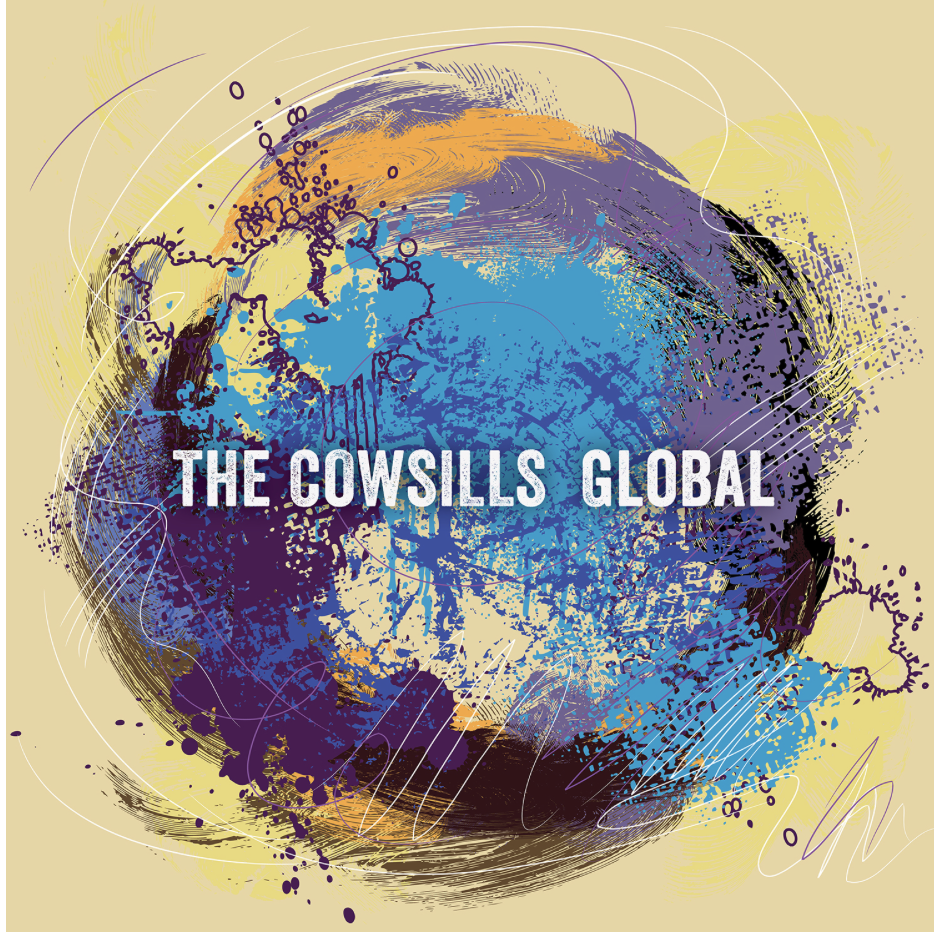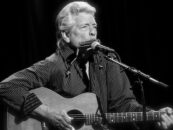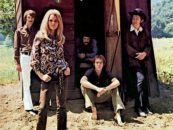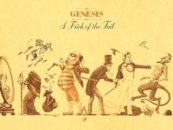The Cowsills—How Their Obscure ’90s ‘Global’ LP Found its Way Back to Life
by Jeff TamarkinFor fans of The Cowsills—the family band best known for its late ’60s hits “The Rain, the Park & Other Things,” “Indian Lake” and “Hair”—the album known as Global has always been something of a mystery, and a holy grail. Recorded in 1992, when four of the siblings briefly reunited two decades after the Cowsills as a band had split up and gone off on their own, it remained unreleased until 1998, when a small batch of 3,000 copies was put into the marketplace privately, albeit failing to make the charts or revive the Cowsills’ career.
The story behind Global, however, doesn’t begin or end there. It’s a complex tale worth retelling in the context of the Cowsills’ biography, particularly because it’s so emblematic of how the music business often discards those who’ve been left behind.
It begins in the early ’90s, when the songs that would eventually become Global were offered to Atlantic Records executive Doug Morris. The honcho liked what he heard but, when he found out it was made by the Cowsills, a band that—due to its wholesome teenybopper image (their mom was in the band, after all!)—had fallen out of favor in the ’70s, he not only turned down signing the album but fired the executive who brought it to him. (Read that full story here. It’s a doozy.)
The recordings failed to interest other labels as well, and so they sat on a shelf until, six years later, the tapes were dusted off and released to little fanfare with the help of an interested party. For various reasons, only the most ardent fans even learned of its existence, although as the years rolled along, its reputation grew among fans of melodic, harmonic pop, even as finding a copy in the wild become next to impossible. Bootlegs thankfully confirmed its existence, and while the music was treasured by those lucky enough to hear it, it remained lost in a black hole to most.

The Cowsills circa 1993 L-R: Robby Scharf, John Cowsill, Bob Cowsill, Susan Cowsill, Paul Cowsill (Photo courtesy The Cowsills)
That was then. Now, the reunited Cowsills—featuring siblings Bob, Paul and Susan of the original group—have been thriving for years, having returned to regular touring and releasing a brilliant new album in 2022, Rhythm of the World. And now Omnivore Records has stepped up, looked back at gaps in their history, and done justice to Global. Originally 11 songs, mostly written or co-written by Bob Cowsill, with contributions from his wife Mary Jo and Cowsill brothers Barry and Paul, its 2024 release now sports three bonus tracks, for a total of 14. The album, recorded at California’s Rumbo Recorders, owned at that time by the since-deceased Daryl Dragon (“The Captain” of Captain & Tennille), features four original Cowsills—Bob (guitars, vocals), Paul (keyboards, vocals), John (drums, vocals) and Susan (vocals, guitar)— performing the songs, with Robby Scharf supplying the bass.
Global is a gem, harmony rich in the Cowsills’ classic style, with musical accompaniment in sync with early ’90s power pop, garage and Americana conventions. There’s no mistaking who this band is after three seconds of those voices, although there is little retro about it that ties directly to their ’60s output.
In this first part of our two-part chat with Bob Cowsill, we talk about how Global came to be, its place in Cowsills history, why it tanked and how it came to be reissued. We’ll follow that up soon with an extensive discussion of the Cowsills’ storied early days, a remarkable tale in itself.
Best Classic Bands: The story of Doug Morris passing on the music that would become Global, and firing the executive who played it for him, is a classic music business tale. Was that snub fairly typical of what the Cowsills were going through during that period?
Bob Cowsill: It’s typical of our career and our responsibility for selling ourselves, explaining ourselves. We’ve always had to do this. We’ve always had to audition, as we call it. So in a way, yeah, it was fairly typical. But that was close, getting to Doug Morris in his office in front of his desk. We’d never been that close.
Hopefully now it’ll be appreciated more.
It has stood a test of decades, in terms of its listenability. It could have been recorded this year.
Watch the official video of “Some Good Years” from Global from the early ’90s
Although there’s a nostalgia factor with the Cowsills, Global and your latest new album, Rhythm of the World, have a very contemporary sound.
Even live, we’re good still. We have our voices. We all sang for decades out of the limelight. I was a pub singer for 28 years, four hours a night with my guitar. It’s a muscle, right? We’re fortunate that way.
You actually did put out Global before, on your own, and it didn’t hit. Why do you think that happened?
We recorded it in the summer of 1992. In ’98 or ’97, the internet gave us an opportunity to put it out there. We made 3,000 copies. We sold them to 23 countries, and it was over. We were not looking for a record deal, [although] we wouldn’t turn it down. We would have definitely said yes to Doug Morris if Doug had said yes to us. But we were not pounding the pavement with this material. We got shot down a lot. A lot of that was our history and how hard it was to work with us because of our dad and our management. [Ed. Note: Dad Bill “Bud” Cowsill was reportedly a notoriously difficult man to work with and often a brute of a father, according to Cowsills biographies and the documentary Family Band.] So that was the end of that. We were not going to do that again, but we’d been through that before. You lick your wounds, you go back to work and back to your life. During Global, we only were going to be a band again because Dick Clark called us to do an oldies tour.
Another great story. You turned down the tour, even though it would have been very lucrative.
We’d been out of the radar and all that business. But Susan was only 36, 35 years old at the time. Is that an oldie? I don’t know. But we had some [new] songs, and a lot [more] were going to come. The excitement of going into the studio and recording them transcended anything. They were sounding good, pretty much out of the gate.
The Dick Clark people weren’t looking for you to do your new songs—they wanted the hits.
When Dick called us in, we convened in Burbank, and we were vacillating. Do we label ourselves [an oldies act]? What do we do? We all needed money, so it was a serious discussion. I had some songs and a little demo I had done with a drum machine and some vocals. “Well, why don’t we do that? And how are we going to do that? I don’t know. But let’s not do that [Clark].” We started picking away at it, until I met a guy in the pub I was singing at, in Santa Monica. He loved the group and understood what we were doing. I got to know him over some months, from performing there every week. He’d come in from Alabama on his business trips. I filled him in, and he asked us one night, “You guys want to do this [record the new songs]?” We just said yes. We quit our jobs and spent a summer being recording artists. This was our job. We got in there 10, 11 every morning, left 7 or 8 every night for a whole summer and did this album. We started playing around the clubs and performed some of these songs live and entered the club scene of L.A.: Club Lingerie, Club 88, Madame Wong’s, China Club. Anyway, that was the first time we weren’t an oldies band. To us as artists, whoa, this is different. People think they’re going to hear something, but they get something different. Even that was going over well because they liked these songs. But after that summer of ’92, there’s nothing. The guy I’m talking about from Alabama that financed this, he went south with insurance fraud and that upset the whole apple cart. The Global sessions in September of that year, when we were done with the main recording, except for a couple of things, were shut down. This thing is then going to sit for six years while the internet arrives, and it’s in hock. We owed $30,000 to the studio. Luckily, Richard Bosworth was our great engineer. And the four of us [Cowsill siblings], and Robby Scharf, our bass player, these six people went in every day and did this. We arranged it on the spot. We produced it on the spot, just created what we thought was a great [album].
Watch the lyric video for “What I Believe” from the reissued Global album
Was there anything that tied the songs on Global together for you?
Look, I’m not the most profound lyricist. I’m not a Bob Dylan that walks around with my notebook everywhere I go. “Oh, I got to write that.” I have nothing to say. But my wife Mary Jo’s there and she’s good with lyrics. So, if I have people that can help me, I can say something. But I will admit that every song I’ve ever written in my whole life, and it’s a bunch of them, always started with a melody. A hundred percent. And almost as a reluctant part of it, “Oh, God, now I got to say something.” I’m that kind of writer. Now with Rhythm of the World, I’ve got Paul and Susan and we’re together on a bus one summer and they are so good with lyrics. It’s not like we’re prolific writers. Every 10 years, 16 songs fall out. We’re not the everyday people. Global is 1992. From 1972, when the fame thing was taken away, ’72 to ’92, that’s 20 years. We were under the radar. And then we’re in a serious recording studio making serious music with these songs in it. It was just so good as an artist to have a summer like ’92. It really was.
Watch the lyric video for “She Said to Me” from Global
You had some interesting guest stars on the album.
Peter Holsapple [co-founder of the dB’s], Berton Averre [lead guitarist of the Knack]. John Stamos—my brother John has known him for decades. He came down and did some percussion for fun. And then Vicki Peterson [of the Bangles]—she’s Susan’s friend.
Anything else that you recall about the making of Global?
We’re glad that it’s here. It gave me an opportunity to add three bonus tracks that we’d kept off [the original]. There’s a number of reasons for that. We didn’t think they quite measured up recording-wise to the other 11. That’s an opinion. Now remember, 1998, this thing’s been sitting for six years. The four of us had returned to our lives. We’re not even communicating much, because we’re very busy with our lives again. So, it’s on the shelf; it’ll end up in our family library. And that’s not a bad spot for your stuff, if that’s all you got. At the time I got it out of hock my brother-in-law Jimmy said, “Hey, we should put Global out.” He thought it was great too. I said, “Well, how do you do that?” So, I did it all alone. I didn’t call my siblings. This was a mistake. I’m owning up to it publicly. I should have called everybody. I didn’t think anybody cared. It’d been six years. I’m used to nobody caring. And I did it all on my own. I had my son, Jason, do the packaging. I did the sequencing. I kept the three songs off. I shouldn’t have, maybe, I don’t know. I’m open to debate if that was the right or wrong decision. I understand that. The true reason was because there was nobody around me to say, “Don’t do that.” I should have picked up the phone but our family, we’re not phone people. We don’t hang on the phone at all. So, I got trapped there, got caught later. Then it comes out, and it’s too late to undo it. Except look what happened 30 years later: I got to undo it. I got those three songs out so people can hear them. And maybe I was wrong. Maybe I was right. It’s an amazing thing that today, in this day and age, that you and I are talking about Global. It’s the biggest shock for me.
[Global, released on Nov. 8, 2024, is available in the U.S. here, in Canada here and in the U.K. here. Their “lost” 1978 album is being released on Sept. 19, 2025. It’s available for pre-order in the U.S. here and in the U.K. here.]
Watch an acoustic version of the song “Some Good Years,” from 2008








3 Comments so far
Jump into a conversationI went to Hollywood Professional Fine Arts/Acting school in the heart of Hollywood from 1964 thru 1972, a school that catered to actors & musicians. The school was built in 1934 for Judy Garland & Mickey Rooney, because Hollywood actors/musicians, had to attend school for 5 days weekly, 4 hours per day by law. Thus, the Cowsills, all of them, attended. Susan was sweet & the rest of the group, including their Mom, were very nice. Mom didn’t have to attend school, though.I remember “Hair”, my favorite song of theirs circa 1968. I liked the group and the family, & I hope that they continue singing & entertaining to their hearts’ desire!
I thought they were on the happy together tour.
Rick was in my first highschool band – Isles of Desolation – great guitar player – late ’60’s